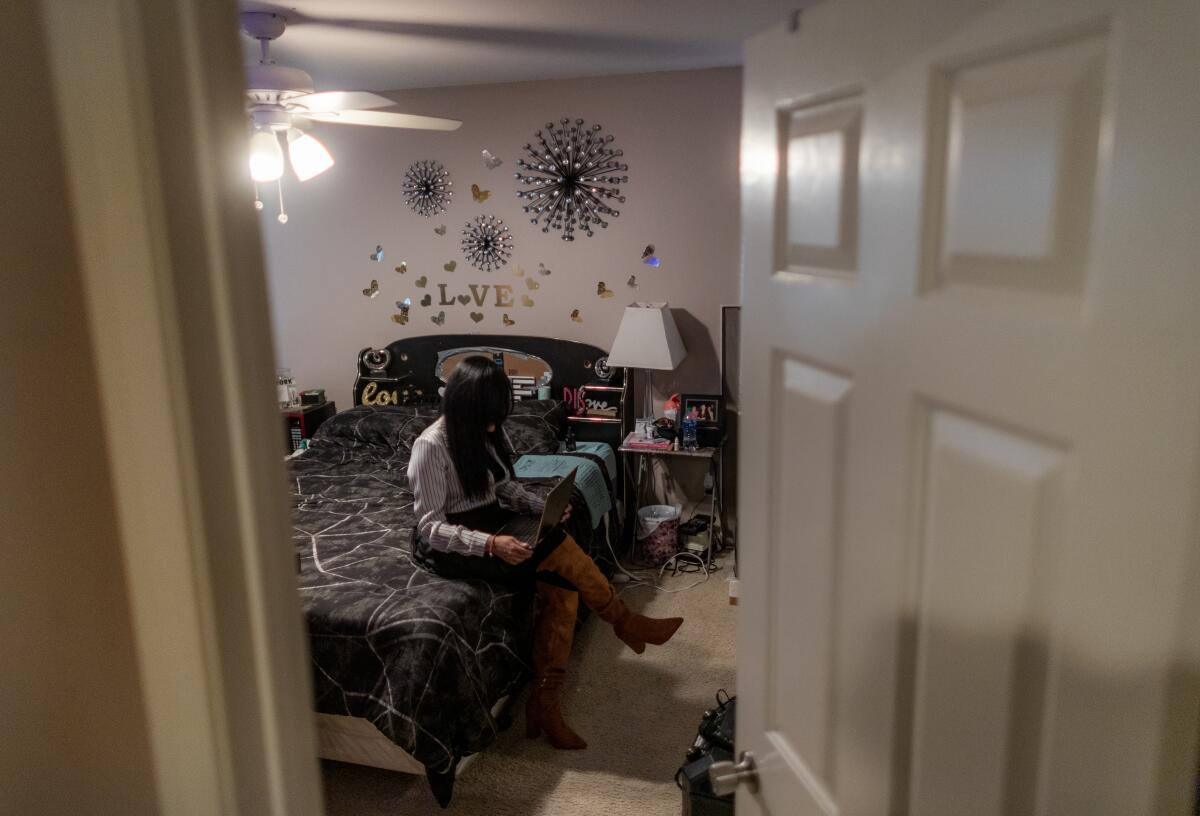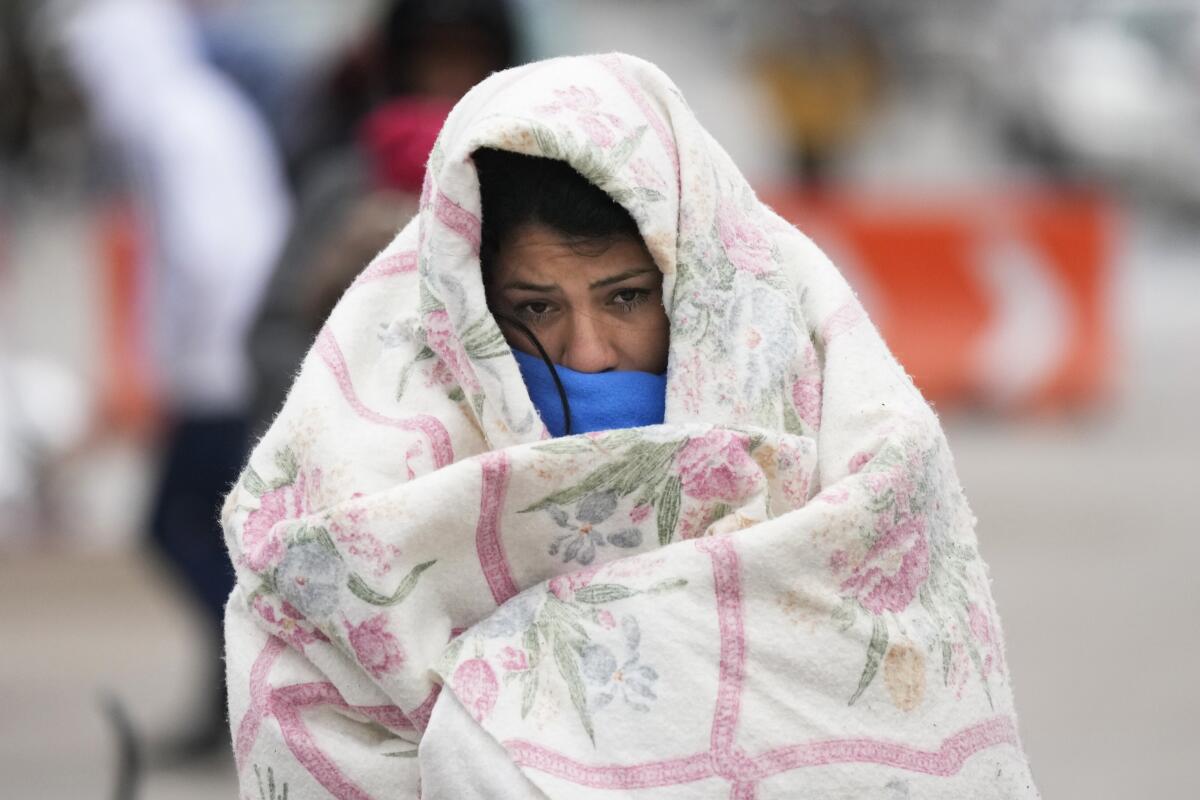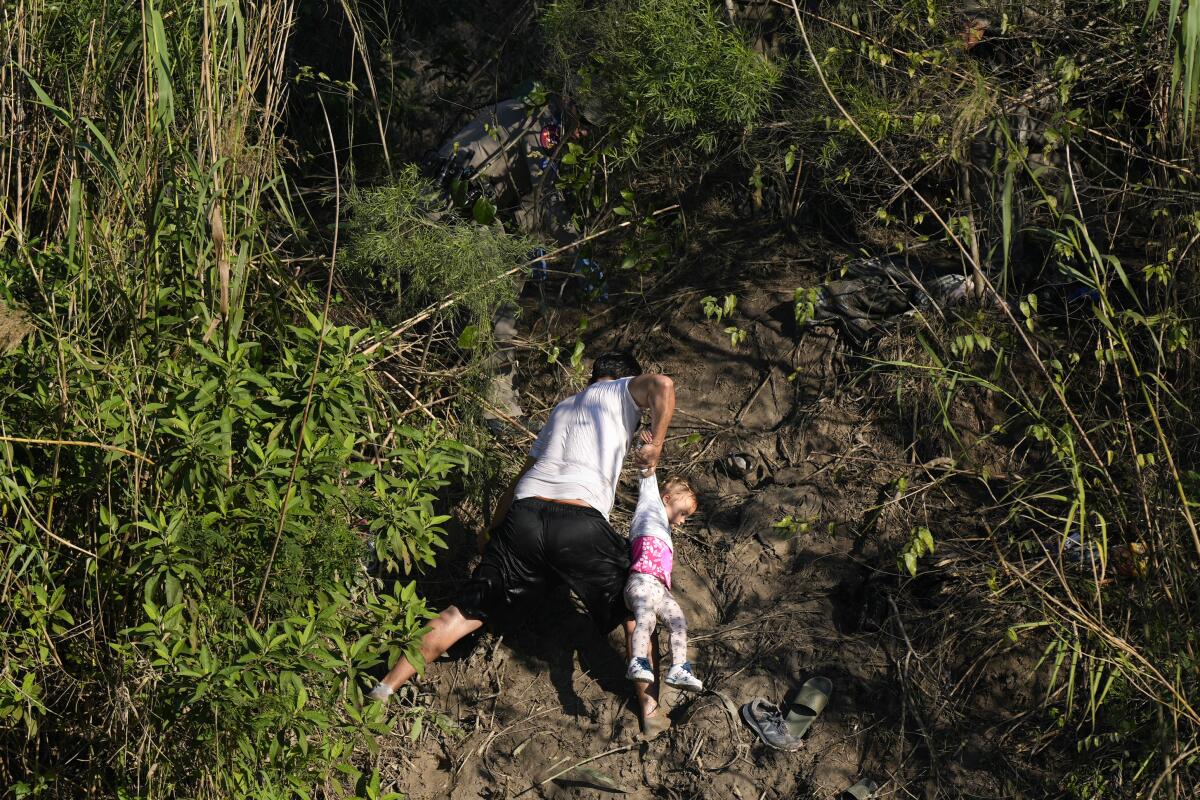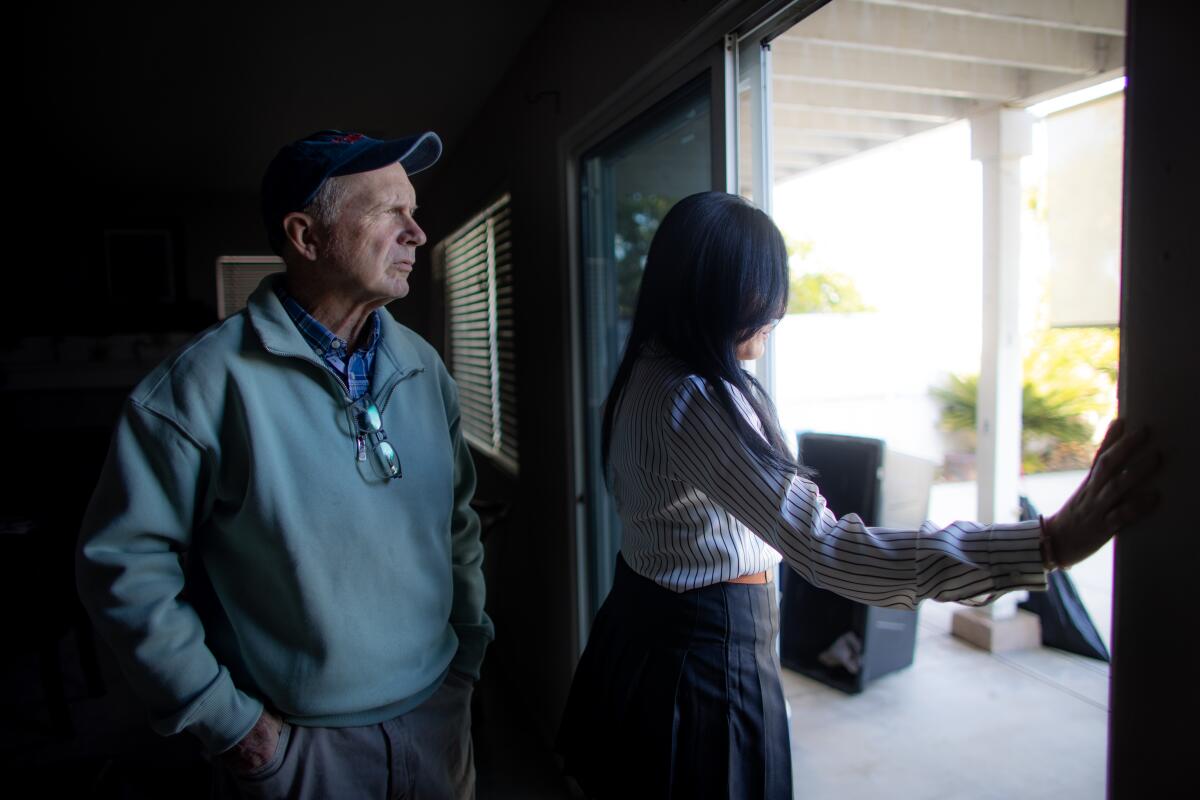Two Venezuelan families. Two immigration policies. Two different outcomes

- Share via
On a recent day in Riverside County, Lisseth, a Venezuelan immigrant, decorated a Christmas tree for her 11-year-old daughter, who adores the holiday and lives in the state of Bolívar in eastern Venezuela. The 45-year-old mother of three hasn’t seen her children in nearly five years, but she’d just received news that U.S. immigration officials had approved her children’s applications to travel from Venezuela to join her permanently in the United States.
Perhaps they’d make it in time for Christmas.
“All I need now are my three angels by my side,” Lisseth told herself when she finished trimming the tree.
Lisseth says she has another guardian angel: Tim Jones, a retired Riverside schoolteacher and journalist who is sponsoring her and her family’s relocation to the United States.
On the same day, more than 1,500 miles away in Matamoros, Mexico, another Venezuelan immigrant, Kerlyn Mora, walked the streets in search of a warm blanket. Cold and wet from the relentless rain, she knocked on doors, begging strangers for whatever they could give.
The 43-year-old, who left her 16-year-old daughter with her father in Venezuela, had been stuck in the border town for more than a month after U.S. border officials removed her to Mexico despite her asylum plea.
“I hope I can find someone to give me something to keep me warm tonight,” she told herself. “I’m just so glad I didn’t bring my daughter to this.”
Lisseth and Mora both are fleeing Venezuela’s broken economy and authoritarian government. Both want to provide for their families. Both seek refuge in the U.S.
But on Oct. 12, two separate Biden immigration policies changed the trajectory of their lives and those of thousands of other Venezuelans seeking access to the U.S. under an immigration system that critics contend is largely arbitrary and favors those with greater personal means. While the Biden administration launched a parole program offering a new way for Venezuelans to enter the U.S. briefly, it paired that effort by expanding the use of a 1940s public health policy, Title 42, that has shut off asylum access to many immigrants — including soaring numbers of Venezuelans — without family connections or economic sponsorship in the U.S.
Title 42, which the Trump administration invoked during the COVID-19 pandemic, allows border agents to quickly remove migrants, ostensibly to safeguard U.S. public health. But it has outraged immigrant rights advocates, the ACLU and others who argue that it’s being kept in place for political rather than medical reasons. On Monday, U.S. Supreme Court Chief Justice John G. Roberts Jr. issued an order temporarily maintaining Title 42, which a trial judge had ordered to be ended this month.

Meanwhile, thousands of Venezuelans like Mora are stuck in Mexican border towns.
The administration framed its new parole program as a lawful pathway into the country, and has endorsed extending the Trump policy as a way to deter Venezuelans from putting their lives in danger by crossing the treacherous Darién Gap — a strip of dense jungle that joins Colombia and Panama — and entering the U.S. without authorization. The parole program, which was modeled after an effort to speed up processing at border crossings for Ukrainians who fled after the Russian invasion, gained immediate interest from countless Venezuelans and those in the U.S. who sought to sponsor them.
The two policies, working conjointly, have reduced the number of Venezuelans who crossed the southwest border without authorization from 1,100 a day on average before mid-October to just around 100 a day, according to a Department of Homeland Security spokesman. Meanwhile, as of Nov. 30, more than 14,000 Venezuelans had been vetted and received approval to travel to the United States under the parole program. More than 5,900 had arrived lawfully as of Nov. 30.
But skeptics say many of the Venezuelans taking advantage of the parole program were unlikely to have made the long and clandestine overland journey anyway because they are among the lucky few who possess the personal resources and connections needed to obtain U.S. sponsorship.
By contrast, Venezuela’s most destitute don’t have the means to secure a U.S. sponsor and are far more likely to join the dangerous mass exodus on foot. Among that group is Mora, who spent weeks trekking from Táchira, Venezuela, to Matamoros, across the U.S. border from Brownsville, Texas.
“To a certain point, this is unjust,” said Juan Fernando Villarreal, Mora’s attorney in Mexico, who with his colleagues at the Resource Center Matamoros have served thousands of Venezuelans who find themselves stuck in Mexico.
“The people who are benefiting from the Venezuelan program are people who already have a stable economic situation. They can take a flight from their country or Mexico City or Cancún to the U.S.,” Villarreal said. “It’s different for the others who must journey through the jungle.”

The parole program is intended to benefit families like Lisseth’s that are seeking to reunite, as well as couples who had been separated. Her three children, their father, her sister and brother-in-law all have been approved to come to the U.S. legally under the program, which allows 24,000 Venezuelan migrants to enter the U.S. and stay legally for up to two years if they have a sponsor who agrees to financially support them.
Before mid-October, Venezuelan migrants for the most part had been able to cross the border and seek protections in the U.S. And because the United States for years has had no formal diplomatic relations with the leftist-populist Venezuelan government, there was no easy legal path for the United States to deport them. Mired in economic, political and social upheaval, Venezuela has seen almost 7 million people — about a quarter of its population — leave since 2014. Most have settled in neighboring Colombia and other South American nations.
The exodus has slowed as economic conditions have improved slightly in Venezuela, and some migrants have returned. But the United States, not a major destination initially, became a magnet in the last year or so as word spread among Venezuelans that asylum seekers arriving at the border were being allowed to enter the country.
Lisseth’s and Mora’s backgrounds helped shape their startlingly different fates.
Lisseth, who didn’t give her last name because she fears repercussions for her family in Venezuela, studied law and became a real estate agent. She hails from a middle-class family with connections in the U.S. She’d flown to the U.S. on a tourist visa five years ago and had brought her children to Disneyland for a family getaway.
She decided it was time to leave Venezuela when one of her neighbors knocked on her door one day in 2018.
“Do you have a plate of food you can give me?” she asked. Her family had only mangoes to eat all day, and her child had just vomited.
Lisseth was shocked to see her neighbor of former “good economic solvency” beg for food. After years of political and economic turmoil, Lisseth had also been drained of much of her wealth. “The next person to ask for a plate of food for my children will be me,” she thought.
Lisseth’s mother, a prominent real estate agent in Venezuela, had settled in the U.S. a few years back and eventually would introduce her daughter to Jones.

Jones, a 66-year-old former columnist at the Orange County Register, had a soft spot for immigrants and used to write a column featuring an immigrant every Thanksgiving. For the last couple of years, Lisseth has rented a room in Jones’ home.
One day in October, Lisseth’s mother texted Jones, asking whether he could sponsor her daughter and possibly her three grandchildren as well.
It quickly sunk in. “She’s asking me to be responsible for her family in the United States, possibly for their entire lives or until they became citizens,” Jones said to himself. He said yes to Lisseth and her mother.
Lisseth has temporary protected status, which allows people from countries beset by political upheaval or natural disasters to obtain a work permit and live in the U.S. on a renewable, temporary basis. She scoffs when asked whether she would have made the treacherous land journey that so many of her compatriots had to make. Lisseth’s children live with her sister in Bolívar, Venezuela. Lisseth hires help to cook, clean and attend to her children.
Mora, by contrast, had no such support network either in her native land or in what she hopes may become her new home.
She fled her country in early September to seek U.S. asylum. While traversing the Darién Gap, she saw fellow travelers fall dead of heart attacks, dehydration and malnutrition. She made it to the U.S.-Mexico border the same week the new policies took effect and was sent back to Matamoros on Oct. 15, she said.
Mora is also well educated and once held a good-paying position at a bank, but she comes from more modest means than Lisseth. She never had a visa and never had traveled to the U.S. She didn’t have many connections to the U.S. except for her mother, who migrated in 2013 and lives in North Carolina. She couldn’t find a sponsor.
Any time people are given a legal pathway to access the U.S. immigration system, like the Venezuela parole program, would-be asylum seekers are going to prefer that option in order to avoid treacherous journeys through jungles and deserts, paying exorbitant smuggling and extortion fees and breaking laws, said Stephanie Leutert, the director of the Central America and Mexico Policy Initiative at University of Texas Austin and a former Biden administration official.
“The issue for the Venezuela parole program is that it is capped at a small number of people compared to the larger population of people who are leaving their countries or who want to leave,” she said.
“However, the legal pathways are far too small to reroute most people, so the result is a small number of lucky people and a much larger number of very unlucky people facing even greater obstacles.”
Reached a few days ago, Mora said she finally was able to enter the U.S. after her attorneys were able to obtain an exemption for her based on humanitarian reasons after two months of limbo in Mexico.
She now lives with her mother in North Carolina, but she didn’t know where to start her asylum process. She didn’t know whether she’d have the money to hire a private immigration attorney.
“I don’t know where to start or what to do,” she said.
Without legal status, it could take Mora years for her asylum case to wind its way through immigration court. In addition, work authorization is not guaranteed, though she will be able to apply for it.
Back in Riverside, Lisseth waits for her family, who’ve bought airline tickets for January. She’s sad that her children weren’t with her for Christmas. But she’s promised to keep the tree up for her daughter until they are reunited.
More to Read
Sign up for Essential California
The most important California stories and recommendations in your inbox every morning.
You may occasionally receive promotional content from the Los Angeles Times.












